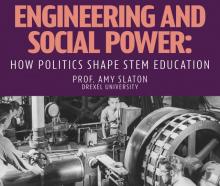
For many generations, engineering schools in the United States have expressed the belief that their most successful graduates don’t merely earn a good living, but also “help society” as they do so, contributing to the American economy and solving the world’s social problems. But the actual classroom experiences of most Engineering students have included little reference to what precisely counts as this sort “help”; who gets to decide; and who ultimately benefits from the projects to which Engineers lend their efforts. Interrogating “Power in Engineering” means thinking about turbines and batteries, not the patterns of political influence and privilege that shape modern life. Standards for rigorous work in STEM education and employment push those matters aside as interfering with the most serious technical effort. We can ask how it feels for today’s Engineering students and faculty–of varying political inclinations; of differing race, ethnic or national heritages; of queer, neurodiverse, or other minoritized identifications—to study and work in a setting where questions about power, political intention, and the complex societal effects of industrial capitalism are not welcome.
This talk is the second in a four-part series produced by the Lafayette Forum on Technology & the Liberal Arts with support from the Class of 1974 Technology and the Liberal Arts Endowment.


